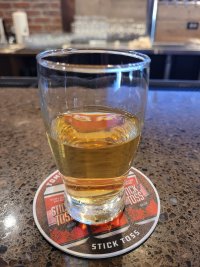- Joined
- Sep 6, 2021
- Messages
- 583
- Reaction score
- 2,515
At Toms River Brewin g, Toms River NJ. Tried 5 oz samples of a pale lager 30 IBU (which did taste like a lager, not a pale ale), and a Kolsch 18 IBU,- lager did not taste appreciably more bitter than Kolsch (pictured). Color looked very similar, but they were clearly different beers. I'm a novice, so forgive my ignorance.
Attachments
Last edited:








































![Craft A Brew - Safale S-04 Dry Yeast - Fermentis - English Ale Dry Yeast - For English and American Ales and Hard Apple Ciders - Ingredients for Home Brewing - Beer Making Supplies - [1 Pack]](https://m.media-amazon.com/images/I/41fVGNh6JfL._SL500_.jpg)

















